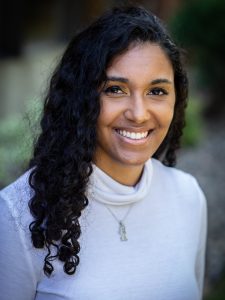 By Maya Bryant
By Maya Bryant
This past Saturday, I sat down in the lounge of Salem Evangelical’s basement at 9:30 a.m. for a monthly Faith Practices & Neighboring Practices cohort meeting. During said meeting, we had the opportunity to take time for contemplation on our faith journeys and how they have shaped us and how we see our faith. (Shout out to Kathie Nycklemoe, one our spiritual directors, for leading this exercise splendidly.)
There were several probing questions that we were asked to answer, including:
- What was an early experience of God or something “other” or “bigger”?
- Where have you experienced the sense of the holy? What was it about this place that felt like a “thin place”?
- If you were to use words to describe God, what words would you use?
NOW, I FOUND THIS daunting. As someone who doesn’t identify with Christianity or the Christian ideal of God, I was taken out of my comfort zone in answering these questions.
As a spiritualist, my ideas of God and Creator are a bit different than most people I’ve encountered in my time working for the Lutheran church. But I thought myself brave enough to answer honestly and was met with kindness and grace from my Lutheran groupmates. And so, I thought I might share my contemplation exercise here answering the same questions:
- The earliest experience of something larger than me was when I was only three years old. It was on my first plane ride to visit family in New Jersey: being able to see the curvature of Earth; watching the cars move “like ants” across the roads; sitting so close to the clouds you could touch them if you reach through the glass. My face was glued to window for practically the whole trip.

“During last weekend’s Faith Practices and Neighboring Practices cohort meeting, we had the opportunity to take time for contemplation on our faith journeys and how they have shaped us and how we see our faith.”
- Where have I sensed the holy? (This question was a bit more difficult for me) I will say the time I felt most equally disturbed and at peace was in high school. The summer leading into my senior year, I took a trip to Europe through a school program. One of our day stops was in Normandy, France, particularly in Caen and Lion-sur-Mer. We visited the Memorial de Caen, and then made our way to Sword Beach. I sprinted up the hill toward the waves and looked out on the ocean. I don’t remember if it was said out loud, or if it was the voice in my head, but I heard, “What a place to die. What a thing to live through.” It was breathtaking and sad. My heart ached and leapt simultaneously: walking on unlucky ground – once covered in dirt, bodies, and blood, now empty and The ocean once again was blue-green and flowing softly against the sand. The utter silence after a moment of intense chaos and violence; I will never forget it.
- I don’t believe God looks like a person. I don’t believe that it is within our depth as humans to understand what something that created the universe is supposed to look like. But I do know that my vision of God is like a giant embrace, … a keeper of Earth and Space, Sky and Water. I sometimes even prefer to call God, “Gaia.” Yes, it comes from the Greek goddess, but Gaia is the mother of all things, the personification of the Earth’s spirit.
These questions are meant to draw out our understanding of our faith and what it means to us to be faithful. Do these questions draw out anything in you? Are there memories you may have forgotten? Are there people who may have faded with time?
What does your faith mean to you, and how can you share that authentically with others?
